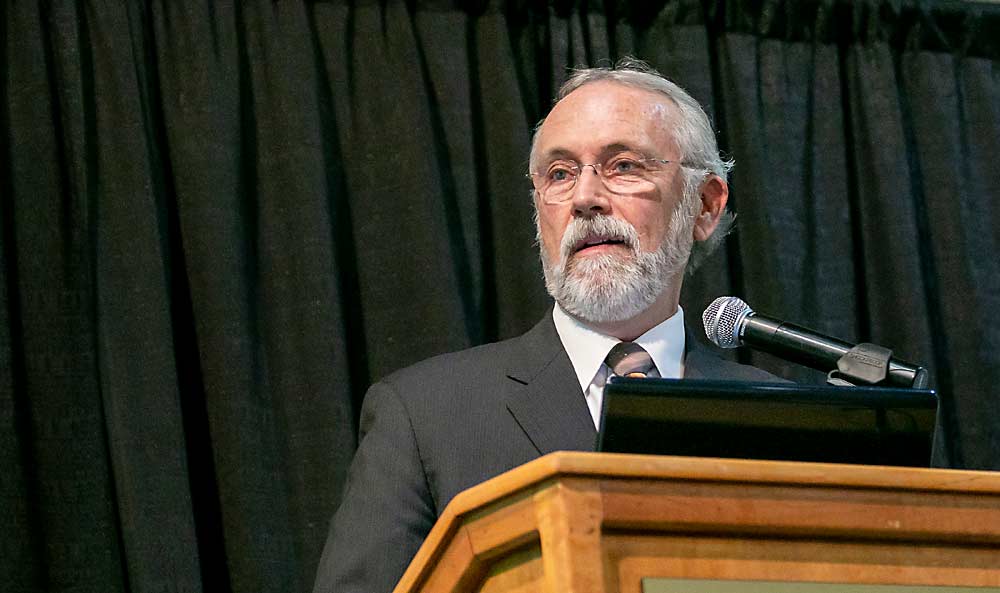
It is an indisputable fact that a grower cannot remain in business without access to a legal, stable and affordable workforce.
With an aging workforce and few new domestic workers entering the field, the Pacific Northwest tree fruit industry has become increasingly reliant on the costly H-2A program to grow and harvest their crops.
H-2A wages have escalated at a staggering rate over the last decade, averaging 5.4 percent per year in Washington and Oregon. Since non-H-2A growers must compete with H-2A employers (paying H-2A wages) for the dwindling number of domestic agricultural workers available, labor costs are driven up for all. This has already contributed to some growers going out of business.
Something must change to halt this trend. On March 18, the U.S. House of Representatives passed the Farm Workforce Modernization Act (FWMA) by a bipartisan vote of 260–165 — providing a glimmer of hope for meaningful reform at the federal level that gives growers some relief.
This bill is a carefully crafted compromise between Rep. Zoe Lofgren, D-Calif., and our own Rep. Dan Newhouse, R-Wash., with agricultural stakeholders (including the Northwest Horticultural Council and the U.S. Apple Association) and the United Farm Workers union at the table.
The FWMA would provide a pathway to legalization for members of the current agricultural workforce who are undocumented, in exchange for these individuals continuing to work in agriculture for a certain number of years.
It would freeze the H-2A program’s Adverse Effect Wage Rate (AEWR) for one year and impose a subsequent cap of 3.25 percent on annual growth (increasing to 4.25 percent in rare cases). The U.S. Department of Agriculture and U.S. Department of Labor would be charged with developing a new wage methodology in 2030.
The bill would also allow for staggered entry of workers under a single H-2A petition, prevent midcontract wage hikes and provide some assistance to growers in offsetting the costs of farmworker housing. It would reduce frivolous lawsuits by allowing growers to request mediation for claims made under labor laws, including the Migrant and Seasonal Worker Protection Act (MSPA) and the requirements of the H-2A program itself.
While a step in the right direction, as with any compromise, the bill does not fix every problem. For example, it does not adequately address our concerns with how states set prevailing wage rates. It places H-2A growers under MSPA — a provision with little practical impact, however, as growers with one or more domestic seasonal workers are already covered by this statute. It imposes mandatory E-Verify for farmers (not packers) on new employee hires, to take effect several years after the bill’s legalization and H-2A reform provisions.
In a perfect world, the Department of Labor would be required to determine that an adverse effect on domestic workers exists before requiring a special wage rate of H-2A employers. The flawed prevailing wage rate would be banished from the program. Housing and transportation would be viewed as an employee benefit instead of requirement. E-Verify would remain voluntary.
However, we do not live in a perfect world. Agricultural workforce reform is controversial, with members of Congress on both sides of the aisle finding reasons to oppose the optimal bill in the eyes of Pacific Northwest tree fruit growers. That is why legislation addressing this issue has only passed the House of Representatives twice in 35 years (this same bill passed the House first in 2019 and then again earlier this year).
The FWMA is the best bill for agricultural employers that could pass the House of Representatives — with its current political makeup — and a necessary step to push for improvements in the Senate and allow for any chance of reform in the next two years.
The other option is to wait and hope that the stars will align so that a bill more perfectly addressing our industry’s priorities can pass Congress to be signed into law at some undetermined point in the future. At the same time, wages will continue to increase at a rate higher than the free market can justify, and more growers will go out of business.
Sen. Mike Crapo, R-Idaho, has stepped forward to lead negotiations with Sen. Michael Bennet, D-Colo., on a Senate companion bill to the FWMA. The NHC will work with Crapo to fight for improvements in the areas of highest priority to Pacific Northwest tree fruit growers. It is important to note that the opportunity is real for addressing some of the NHC’s key concerns, because a minimum of 10 Republicans must support the bill for it to pass the Senate.
If we get to the point where an amended version of the FWMA bill comes before the Senate, the NHC will work with our advisors and under the direction of our board of trustees to evaluate whether it represents enough of an improvement over the status quo to garner our full support.
There is no question that efforts to pass agricultural workforce reform this year still face substantial headwinds. The partisan acrimony in Congress is high — making it difficult for any bipartisan effort to move forward, and immigration issues are particularly sensitive. However, as of today, the hope is still alive. •
Awaiting H-2A rule changes
Growers should be aware that changes to the H-2A program may occur in 2021, regardless of whether agricultural workforce reform passes Congress. The U.S. Department of Labor released a “final” rule in January to make reforms of the H-2A program within the scope of current law — some of which were positive and some of which were not. This rule was not officially published before President Biden took office. The new administration suspended final publication of this rule and may release its own version later this year — making effective the portions of the Trump rule that the new administration agrees with, while dropping the provisions that the new leadership does not.
—by Kate Tynan
Kate Tynan is the senior vice president of the Northwest Horticultural Council.






Leave A Comment